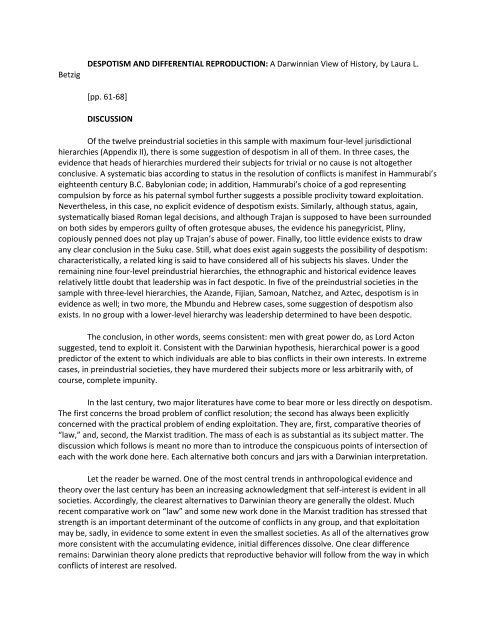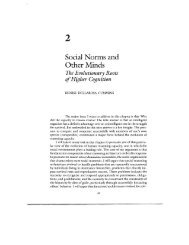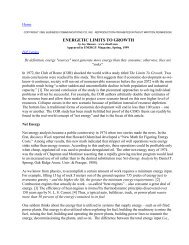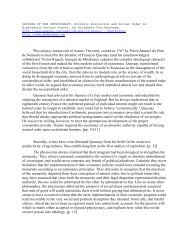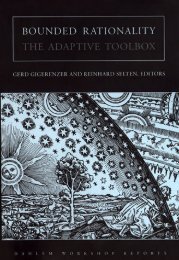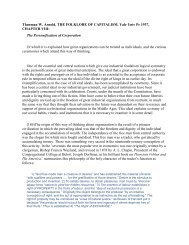DESPOTISM AND DIFFERENTIAL REPRODUCTION: A Darwinnian ...
DESPOTISM AND DIFFERENTIAL REPRODUCTION: A Darwinnian ...
DESPOTISM AND DIFFERENTIAL REPRODUCTION: A Darwinnian ...
Create successful ePaper yourself
Turn your PDF publications into a flip-book with our unique Google optimized e-Paper software.
Betzig<br />
<strong>DESPOTISM</strong> <strong>AND</strong> <strong>DIFFERENTIAL</strong> <strong>REPRODUCTION</strong>: A <strong>Darwinnian</strong> View of History, by Laura L.<br />
[pp. 61-68]<br />
DISCUSSION<br />
Of the twelve preindustrial societies in this sample with maximum four-level jurisdictional<br />
hierarchies (Appendix II), there is some suggestion of despotism in all of them. In three cases, the<br />
evidence that heads of hierarchies murdered their subjects for trivial or no cause is not altogether<br />
conclusive. A systematic bias according to status in the resolution of conflicts is manifest in Hammurabi’s<br />
eighteenth century B.C. Babylonian code; in addition, Hammurabi’s choice of a god representing<br />
compulsion by force as his paternal symbol further suggests a possible proclivity toward exploitation.<br />
Nevertheless, in this case, no explicit evidence of despotism exists. Similarly, although status, again,<br />
systematically biased Roman legal decisions, and although Trajan is supposed to have been surrounded<br />
on both sides by emperors guilty of often grotesque abuses, the evidence his panegyricist, Pliny,<br />
copiously penned does not play up Trajan’s abuse of power. Finally, too little evidence exists to draw<br />
any clear conclusion in the Suku case. Still, what does exist again suggests the possibility of despotism:<br />
characteristically, a related king is said to have considered all of his subjects his slaves. Under the<br />
remaining nine four-level preindustrial hierarchies, the ethnographic and historical evidence leaves<br />
relatively little doubt that leadership was in fact despotic. In five of the preindustrial societies in the<br />
sample with three-level hierarchies, the Azande, Fijian, Samoan, Natchez, and Aztec, despotism is in<br />
evidence as well; in two more, the Mbundu and Hebrew cases, some suggestion of despotism also<br />
exists. In no group with a lower-level hierarchy was leadership determined to have been despotic.<br />
The conclusion, in other words, seems consistent: men with great power do, as Lord Acton<br />
suggested, tend to exploit it. Consistent with the Darwinian hypothesis, hierarchical power is a good<br />
predictor of the extent to which individuals are able to bias conflicts in their own interests. In extreme<br />
cases, in preindustrial societies, they have murdered their subjects more or less arbitrarily with, of<br />
course, complete impunity.<br />
In the last century, two major literatures have come to bear more or less directly on despotism.<br />
The first concerns the broad problem of conflict resolution; the second has always been explicitly<br />
concerned with the practical problem of ending exploitation. They are, first, comparative theories of<br />
“law,” and, second, the Marxist tradition. The mass of each is as substantial as its subject matter. The<br />
discussion which follows is meant no more than to introduce the conspicuous points of intersection of<br />
each with the work done here. Each alternative both concurs and jars with a Darwinian interpretation.<br />
Let the reader be warned. One of the most central trends in anthropological evidence and<br />
theory over the last century has been an increasing acknowledgment that self-interest is evident in all<br />
societies. Accordingly, the clearest alternatives to Darwinian theory are generally the oldest. Much<br />
recent comparative work on “law” and some new work done in the Marxist tradition has stressed that<br />
strength is an important determinant of the outcome of conflicts in any group, and that exploitation<br />
may be, sadly, in evidence to some extent in even the smallest societies. As all of the alternatives grow<br />
more consistent with the accumulating evidence, initial differences dissolve. One clear difference<br />
remains: Darwinian theory alone predicts that reproductive behavior will follow from the way in which<br />
conflicts of interest are resolved.
Theories of Conflict Resolution<br />
In 1895, Emile Durkheim wrote that understanding individual behavior is irrelevant to<br />
understanding society. In the preface to the second edition of “The Rules of Sociological Method,” he<br />
insisted to his critics that a man’s control over his social order is less than obvious. “In vain have<br />
repeated experiences taught him that this omnipotence, the illusion of which he complacently<br />
entertains, has always been a cause of weakness in him; that his power over things really began only<br />
when he recognized that they have a nature of their own, and resigned himself to learning this nature<br />
from them” [1895 (1966):lviii; contrast Alexander, 1979:82-86]. A raison d’etre for the science of society<br />
was to be that understanding individual motivation would be inadequate, if not irrelevant, to account<br />
for social phenomena, including law.<br />
According to Durkheim, in “mechanically integrated,” essentially, preindustrial societies, “it is<br />
the assembly of the people which renders justice” [1893 (1933):76], not to an acting individual’s<br />
advantage (p. 86), but to penalize offenses against the collective consciousness (p. 80). In this case,<br />
“Despotism, at least when it is not a pathological, decadent phenomenon, is nothing else than<br />
transformed communism” (p. 196).<br />
Many subsequent theorists have similarly stressed the social function of conflict resolution. For<br />
instance, Malinowski, whose ethno-graphic interest in “law” was pioneering, suggested that its essential<br />
objective in Trobriand Island society was “to ensure a type of cooperation which is based on mutual<br />
concessions and sacrifices for a common end” [1926 (1982):64, cf. pp. 92-93]. More recently, in a<br />
comparative review of “primitive” law, Hoebel, although he acknowledged the existence of societies<br />
with “invidious law systems,” defined law “not as an instrument of exploitation” (1954:327), but as “the<br />
creative consequence of a people’s efforts to achieve and maintain a self-limiting order” (p. 326).<br />
It is, of course, the democratic ideal that the “law” should be constituted by men of equal<br />
strength in greater numbers. For Roscoe Pound, for example, law is that ideal. “Many today say that law<br />
is power, where we used to think of it as a restraint upon power. . . . The legal order as a highly<br />
specialized form of social control rests upon the power or force of politically organized society. But so<br />
far from the law being power, it is something that organizes and systematizes the exercise of power and<br />
makes power effective toward the maintaining and furthering of civilization” (1942:49). In fact, though,<br />
the “law” has been historically laid down by men of greater force. This is consistent with the Darwinian<br />
prediction: any sanction for or against an action is likely to reflect the interests of those able to<br />
administer it. It is, of course, possible that strength in numbers might come to exceed the strength of<br />
any one individual and that the distribution of power might grow so equitable that the interests of a<br />
majority would generally overrule those of a minority. But historically, power has often been distributed<br />
quite inequitably; accordingly, “society,” as a utilitarian majority, has not usually been the “law’s”<br />
beneficiary.<br />
This conclusion is increasingly in evidence in the cross-cultural literature on conflict resolution. It<br />
might be argued that it was anticipated in Maine’s (1864) decision that in early “law,” offenses, including<br />
murder and theft, were more often considered to have been committed against individuals, rather than<br />
against society. “If therefore the criterion of a delict, wrong, or tort be that the person who suffers it,<br />
and not the State, is considered to be wronged, it may be asserted that in the infancy of jurisprudence<br />
the citizen depends for protection against violence or fraud not on the Law of Crime but the Law of Tort”<br />
(p. 359). This is especially true as in preindustrial groups trespass against the social welfare and the<br />
ruler’s welfare were generally considered to be one and the same. Other writers, either reluctant to lack
a theory of individual motivation (e.g., Ehrlich, 1936), or, in the Durkheimian tradition, explicitly<br />
rejecting the need of one (e.g., Black, 1976), have empirically determined that “law” is in fact related to<br />
power. But, without such a theory, they have been unable to explain their generalizations, or, except as<br />
a historical lesson, to offer predictions.<br />
Many of the last generation of writers on the subject of early “law” have explicitly rejected an<br />
eclipsing focus on social over individual interests. Starr and Yngvesson, for example, have complained<br />
that “A Durkheimian emphasis on harmony of interests and shared goals has heavily influenced our<br />
thinking and seems to have shaped the ways in which anthropologists have perceived the handling of<br />
disputes. . . . A major problem of most anthropological dispute settlement studies is the failure to link<br />
status, rank, and class orientations to an understanding of actors’ roles in, and outcomes of, the<br />
disputing process” (1975:559, 563; see also Pospisil, 1967:6). As members of a team of researchers sent<br />
into ten different cultures to address these problems, Starr and Yngvesson and several other students of<br />
Laura Nader confirmed that kinship, wealth, and status are generally among the most important<br />
determinants of conflict resolution (Nader and Todd, 1978). Introducing those findings, Nader and Todd<br />
admonished that “it is perhaps obvious to note that power and control over scarce resources are<br />
interconnected and relevant to disputing, and yet there has been little systematic discussion of law and<br />
the distribution of power in either the sociological or the anthropological literature. . . . We need to<br />
understand the processes whereby disputing mechanisms maintain and legitimize the distribution of<br />
power, and the means by which the powerful control disputing mechanisms” (pp. 19-20). In the last few<br />
years, a few prominent writers on law in preindustrial societies have begun in a tentative way to look at<br />
the possibility that a theory of evolved human motivation might yield predictions about and<br />
explanations of conflict resolution (e.g., Gruter and Bohannan, 1982, including Hoebel, 1982).<br />
Marxism<br />
On the subject of human society, the single most important alternative to Darwinism is probably<br />
Marxism. It is especially relevant to the subject of despotism, as the explicit end of Marxist thought has<br />
always been an end to exploitation.<br />
Marxism and Darwinism have a great deal in common. It was in large part Darwin’s work on<br />
organic evolution which inspired Marx’s, and many others’ including Morgan’s (see Terray, 1972),<br />
attempts to come up with a parallel theory of social change. Social evolution, like biological evolution,<br />
was to be explicable in terms of changing historical conditions (e.g., discussion in Bloch, 1983). And for<br />
Marx, as for Darwin, the most important of those conditions were those which effected the ways in<br />
which people solved the material problems of life: production and reproduction. These parallels are<br />
fundamental. In order personally to acknowledge his debt, Marx originally proposed to dedicate<br />
“Capital” to Darwin (ibid).<br />
In other crucial respects, though, the theories are far apart. The Darwinian hypotheses put<br />
forward here differ, first, from the Marxist insistence that the simplest human societies were without<br />
exploitation, second, from the Marxist emphasis on production, rather than reproduction, and, last but<br />
most importantly, from the Marxist prescription of a specific form of social evolution, socialist<br />
revolution.<br />
The first difference, essentially, the idea of “primitive communism,” derives from Marx and<br />
Engels’ incorporation of the work of Lewis Henry Morgan into their scenario of world history. In his work<br />
on “Ancient Society” (1877), Morgan delineated two broad plans of government: societas and civitas.
The first was founded on kinship, or more specifically, on clanship or gens, while the latter was based on<br />
territory, or property, and gave rise to the state. In gentile society, “The state did not exist. Their<br />
governments were essentially democratical” [Morgan, 1877 (1978):67]. Not only productive property,<br />
but reproductive rights, in husbands and wives, were supposed to have been held in common to varying<br />
degrees in gentile society. Only the growth of property was to have given rise to inequality, and made<br />
necessary a reorganization of society on the basis of territory (e.g., p. 215). To Morgan, it followed that<br />
“the element of property . . . has given mankind despotism, imperialism, monarchy, privileged classes,<br />
and finally representative democracy” (p. 342).<br />
It might be important to speculate to what extent Morgan’s idea that productive rights were<br />
once held communally was based upon his, and his contemporaries’ (e.g., McLennan, 1865), idea that<br />
the earliest human societies were characterized by primitive promiscuity. For Morgan, in the<br />
“consanguine” family, inferred from a form of classificatory kinship terminology, for every man, “all my<br />
sisters are my wives, as well as the wives of my several brothers” (Morgan, 1877:410); husbands<br />
similarly, to at least some extent, were communally shared. To an even greater extent, he assumed, an<br />
earlier society might have practiced promiscuity. “The state of society indicated by the consanguine<br />
family points with logical directness to an anterior condition of promiscuous intercourse. There seems to<br />
be no escape from this conclusion, although questioned by so eminent a writer as Mr. Darwin” (pp. 417-<br />
418; cf. Darwin, 1871:893). The crucial extrapolation may have been that once reproductive rights were<br />
supposed to have been held in common, productive rights much more easily might have been supposed<br />
to have been shared. In Morgan’s words, “Communism in living must, of necessity, have prevailed both<br />
in the consanguine and in the punaluan family, because it was a requirement of their condition” (p.<br />
416).<br />
Engels, after Marx’s death, fit Morgan’s conclusions to a Marxist interpretation. The initial stage<br />
of human society, in which property was supposed to be held communally and conjugal relationships to<br />
be characterized by promiscuity, was lifted whole from “Ancient Society.” “And a wonderful constitution<br />
it is, this gentile constitution, in all its childlike simplicity. . . . All are equal and free—the women<br />
included” [1884 (1964):86]. Consistent with this rather romantic conception, the gentile constitution<br />
“possessed no means of coercion except public opinion” (p. 154; see also Bloch, 1983:60). A presumed<br />
fall from grace was attributed by Engels, as it had been by Morgan, to an increase in accumulable,<br />
heritable, wealth (especially pp. 144-153). Eventually, “The first attempt at forming a state consists in<br />
breaking up the gentes by dividing their members into those with privileges and those with none, and by<br />
further separating the latter into two productive classes and thus settling them one against the other”<br />
(p. 99).<br />
A society free of exploitation was supposed to have been supplanted by the rise of social<br />
classes, one of which for the first time gained privileged access to the basic resources necessary to<br />
sustain life, while the other was cut off. Upon the heels of this change the state is supposed to have<br />
come into existence in order to preserve, by the use of force, the interests of the privileged class. The<br />
essential element in the Marxist conception of social evolution has therefore been that a sharp break<br />
occurred in history with the rise of the state; with this break, societies ceased to be “egalitarian,” and<br />
exploitation and differential privilege emerged.<br />
For the same reason that “primitive promiscuity,” wherever common reproductive interest is<br />
insufficient to override individual interest, is incompatible with Darwinian theory, so is an absence of<br />
“private” property: both spouses and resources are means to reproductive ends. As individuals differ in<br />
their ability to attain them, having greater numbers of kinsmen or allies, more wealth, or any other
edge, Darwinian theory predicts that they will differ in their access to them. Unlike the Marxist tradition,<br />
it predicts no sharp dichotomy in social relations; rather, to the extent that reproductive interests are<br />
not held in common, Darwinian theory predicts that individuals will exploit differences in strength<br />
wherever they exist.<br />
A century of accumulated evidence about primitive society often has continued to be<br />
dichotomized into the “egalitarian” and “exploitive” forms of government originally delineated (e.g.,<br />
Fried, 1967; references in Bloch, 1983). Recently, though, perhaps more in the spirit of Marx and Engels’<br />
original empiricism [e.g., 1845 (1976):31], some Marxist scholars have begun to suggest that no society<br />
has ever existed without classes. In, for example, an extensive review of Claude Meillassoux’s (1964)<br />
Marxist analysis of Guro tribal economy, Emanuel Terray (1972) has been forced to defend an absence<br />
of class and exploitation in that society, following a contrary assertion by Georges Dupré and Pierre-<br />
Philippe Rey (n.d.), that “exploitation does . . . take place in traditional society” (Terray, 1972:167), and<br />
that classes therefore exist in such cases as well. A suggestion that some form of exploitation has been<br />
in evidence in even the smallest societies is consistent with the argument, and supporting evidence,<br />
here that conflicts of interest in all societies are resolved with a consistent bias in favor of men with<br />
greater power.<br />
Other developing Marxist scenarios have begun to suggest a possible transition between<br />
classless and class society. An embryonic form of exploitation, or “Oriental despotism,” is supposed by<br />
some to coincide with what Marx [1857-1858 (1973)] termed the “Asiatic” mode of production. Interest<br />
in this form of social relations, after a long dormancy phase, is being revived (see Dunn, 1982; Wittfogel,<br />
1957; Krader, 1975; Godelier, 1978, 1981; Bailey and Llobera, 1981). The Asiatic mode of production was<br />
supposed to have been characteristic of societies in which property was owned communally, but in<br />
which production was often organized by a central bureaucracy. As Godelier has said, “This power at<br />
first takes root in functions of common interest . . . and, without ceasing to be a functional power,<br />
gradually transforms itself into an exploitative one” (1981:264). The view of despotism as a form of<br />
exploitation intermediate between primitive communism and capitalism may be somewhat<br />
problematic: the despotic practice of having subjects executed without pretext might be considered a<br />
form of “exploitation,” though not, technically, the Marxist one, even greater than under some forms of<br />
capitalism. The point, though, is that developments softening the original dichotomy between exploitive<br />
and non-exploitive societies appear to bring Marxist theory closer to the facts.<br />
Finally, that despotic power is in fact exploitive in the Marxist sense, that is, that the products of<br />
surplus labor are in fact appropriated (e.g., Terray, 1975:94), is highly likely. As Chagnon (1979a), again,<br />
has pointed out, at least some such surplus probably has to be appropriated to feed the families of<br />
reproductively successful men.<br />
This brings up the second point of contrast between Marxism and Darwinism: the relative<br />
emphasis on production and reproduction. Again, for both, the essential determinant of social relations<br />
is the means by which individuals meet the objectives of producing and reproducing. The essential<br />
difference is that Darwinism is much more explicit: individuals have evolved to maximize their genetic<br />
representation in descendant generations. The relatively vague Marxist specification of motivation is<br />
common too to latter-day versions of historical materialism, including cultural materialism (see Harris,<br />
1979:60-63). Marx and Engels were concerned with “the first premise of all human existence and,<br />
therefore, of all history, . . . that men must be in a position to live in order to be able to ‘make history.’<br />
But life involves before everything else eating and drinking, housing, clothing, and various other things.<br />
The first historical act is thus the production of the means to satisfy these needs, the production of
material life itself” [1845 (1976):41-42]. This is echoed later in Engels’ assertion that, “according to the<br />
materialistic conception, the determining factor in history is, in the final instance, the production and<br />
reproduction of the immediate essentials of life[,] . . . on the one side, the production of the means of<br />
existence . . . , on the other side, the production of human beings themselves, the propagation of the<br />
species” [1884 (1964):5; cf. Engels, 1890].<br />
This is obviously a close approximation of, but not identical to, the Darwinian prediction. The<br />
clearest difference between the theories remains that Marxism makes no explicit prediction that<br />
exploitation should coincide with the means to reproduction. It has been suggested that, in order to<br />
increase the plausibility of their prescriptions for a socialist society, Marx and Engels may have been<br />
reluctant to postulate any specific panhistorical human propensities (see, e.g., Venable, 1945; Masters,<br />
1977, 1978; Bloch, 1983). But again, the unequivocal evidence that social relations do change with<br />
material conditions makes such a fiction unnecessary: novel forms of society continue to emerge with<br />
novel forms of industry. It is even possible that changing social relations by changing conditions might<br />
better be facilitated by an understanding of evolved motivations than by ignorance of them. Neither a<br />
Marxist theory acknowledging the historical absence of socialism, nor Darwinism, should preclude the<br />
possibility of future conditions under which individual interests might become common interests: under<br />
which individual welfare might best be served by serving the welfare of society (cf. Lewontin, Rose, and<br />
Kamin, 1984). Neither theory precludes the possibility of the evolution of socialism.<br />
Finally is the last, and most important, point of contrast: Marxism is, above all, a prescription for<br />
socialism by revolution; Darwinian theory incorporates no prescription at all. Darwin declined Marx’s<br />
“Capital” dedication because he was already “horrified. . . by the religious and political repercussions of<br />
what he had written” (Bloch, 1983:5). Nevertheless, again, even here the theories have more than is at<br />
first apparent in common: neither Darwinism nor Marxism precludes the possibility of the evolution of<br />
any form of human society.


